From Observability to Pull Request: N|Solid 6.3.1 Brings AI-Driven Performance Fixes to GitHub
A new release that connects N|Solid’s AI optimization engine directly to GitHub for seamless, secure performance improvements.
At NodeSource, we’re continuously enhancing N|Solid’s AI-powered optimization workflow, helping teams identify, validate, and implement performance improvements faster and more securely.
Our latest release N|Solid 6.3.1, introduces GitHub PR and MCP (Model Context Protocol) Integrations, The Model Context Protocol (MCP) is an emerging standard that allows AI systems to communicate securely with external tools and repositories. This is a major step forward in automating how developers move from insights to actionable code changes.
How the GitHub Integration Works
This feature is powered by our new MCP (Model Context Protocol) Integration system, beginning with GitHub support. MCP enables N|Solid’s AI system to communicate securely and contextually with external tools.
The GitHub MCP Integration connects N|Solid’s AI to GitHub’s remote MCP server. Once connected, you can:
- Install the integration through N|Solid Settings → Integrations
- Configure it with a fine-grained personal access token
- Manage, disable, or uninstall the integration at any time \
For organizations, fine-grained tokens are recommended. These may require approval from the GitHub organization owner, ensuring that all PR actions respect your security and governance policies.
Currently, GitHub is the first supported MCP target, but this foundation will enable future integrations with other developer tools and code assistants.
Real-Time Optimization Flow
Once the integration is active, the workflow looks like this:
- Run AI Optimization Reports from the N|Solid Console
- The AI analyzes the CPU profile, identifies hotspots, and generates code improvements
- N|Solid automatically benchmarks the new versions
- If improvements exceed the threshold, the system enables the “Create Pull Request” option
- You select the GitHub organization, repository, and branch, and N|Solid handles the rest \
Each PR includes a detailed summary of what was optimized, by how much, and which files were touched. The result is a transparent, measurable, and automated optimization loop, right from your N|Solid runtime to your GitHub workflow.
From AI Insights to GitHub Pull Requests
Until now, when N|Solid’s AI-generated reports detected potential optimizations, developers could review them and manually apply the suggested code improvements.
With this new release, N|Solid can now automatically generate GitHub Pull Requests (PRs) for validated optimizations that meet a performance threshold, making it easier than ever to apply AI-recommended improvements safely and transparently.
Before getting started, make sure the permissions for the “mpc integrations” is enabled in the accounts portal:
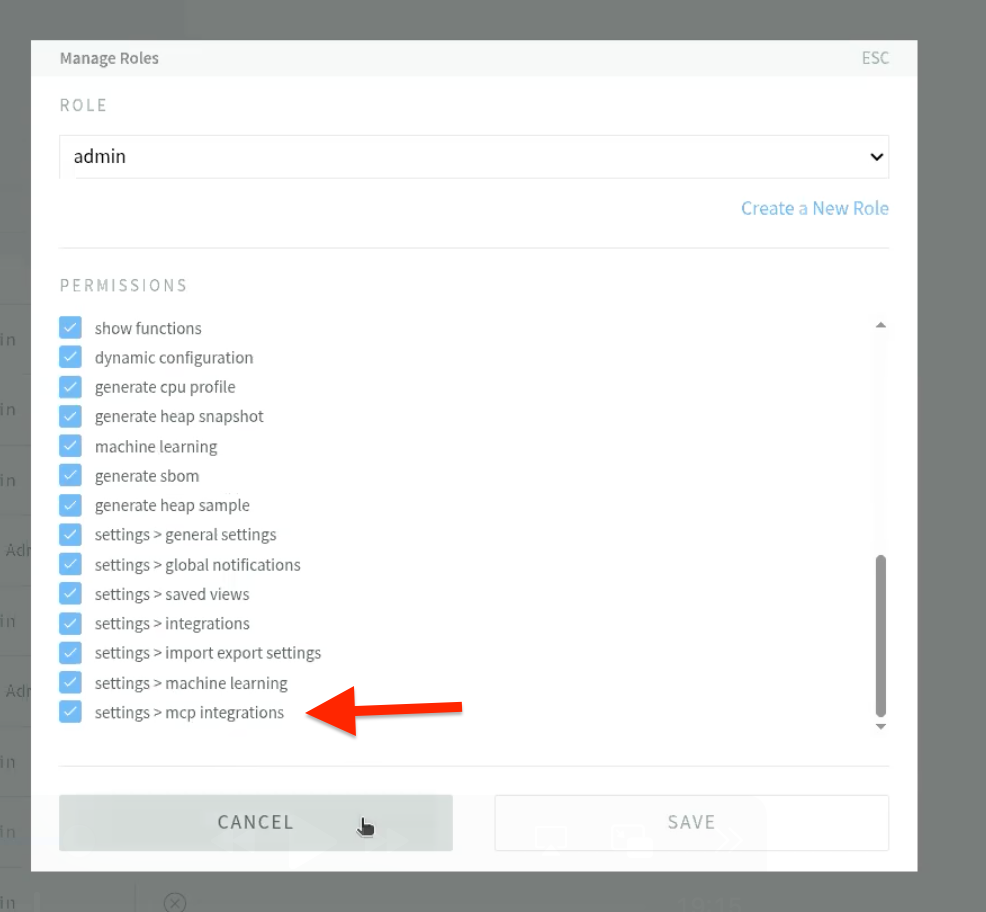
Now, In the N|Solid Console, you will be able to see the MCP Integrations:
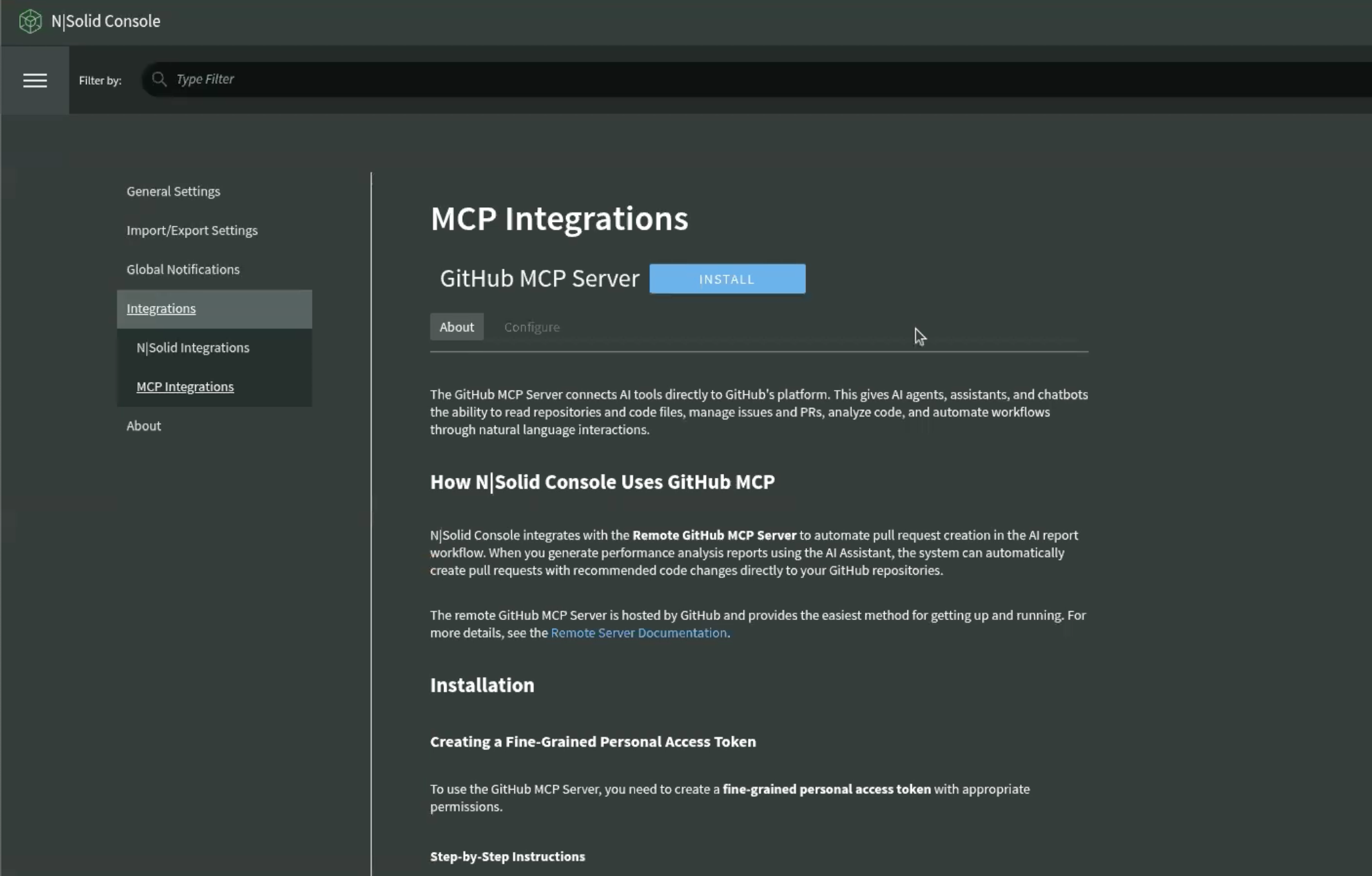
The initial installation happens in the install button. Click in “Configure” and add the GitHub access token:
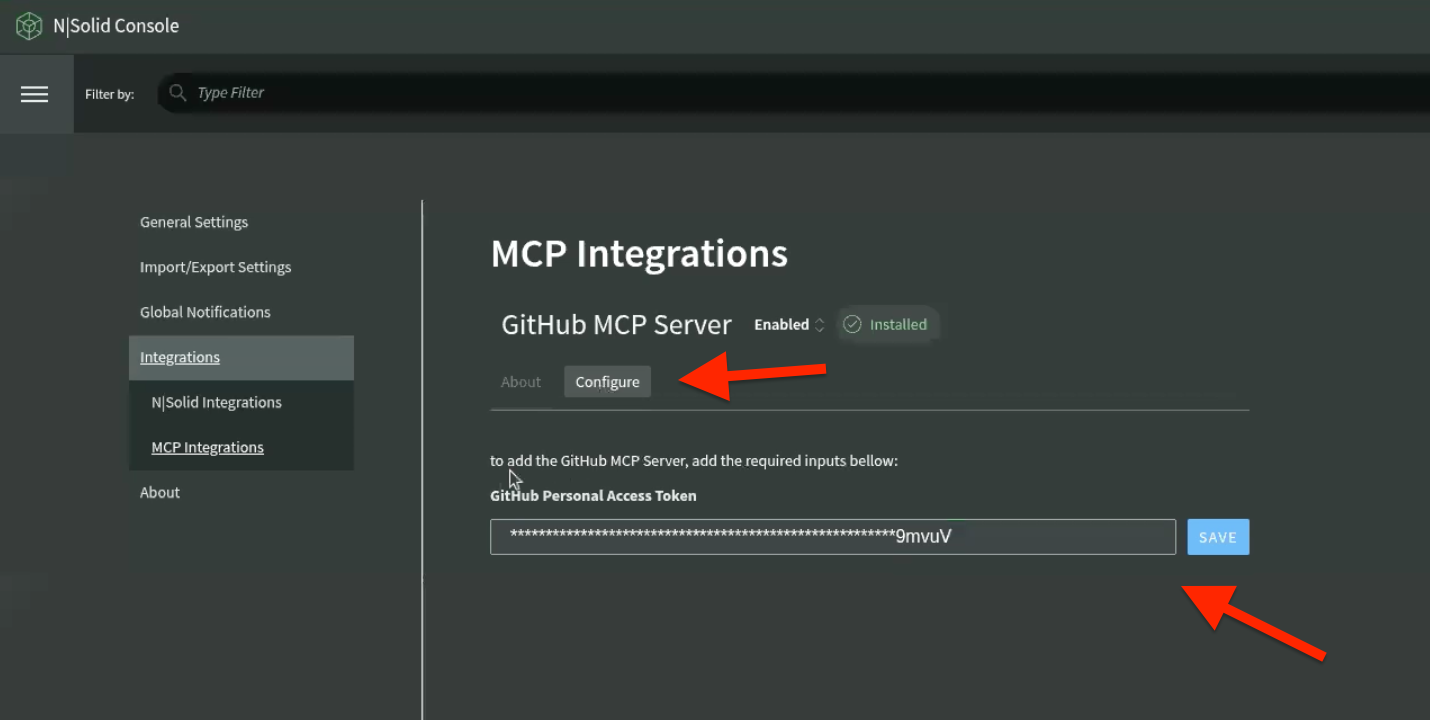
Here’s how it works:
-
Run an AI Performance Report You start with an AI-generated performance analysis based on a CPU profile. N|Solid’s AI identifies and suggests function-level optimizations.
-
Validate Through Benchmarks Every suggestion is benchmarked internally, the AI runs both the original and optimized versions of the function multiple times (15 iterations by default) and compares results to ensure the improvement is statistically significant.
-
Apply a Threshold for Quality Control Only optimizations that achieve a minimum 25% performance improvement are considered valid. Suggestions below this threshold are ignored to maintain high-quality recommendations. \
-
Generate a GitHub Pull Request Automatically When an optimization passes validation, N|Solid prompts you to create a PR directly from the report.
In the following image, you can see the recommendations and “Create Pull Request” button. When clicked, you can select your GitHub organization, repository, and branch. \
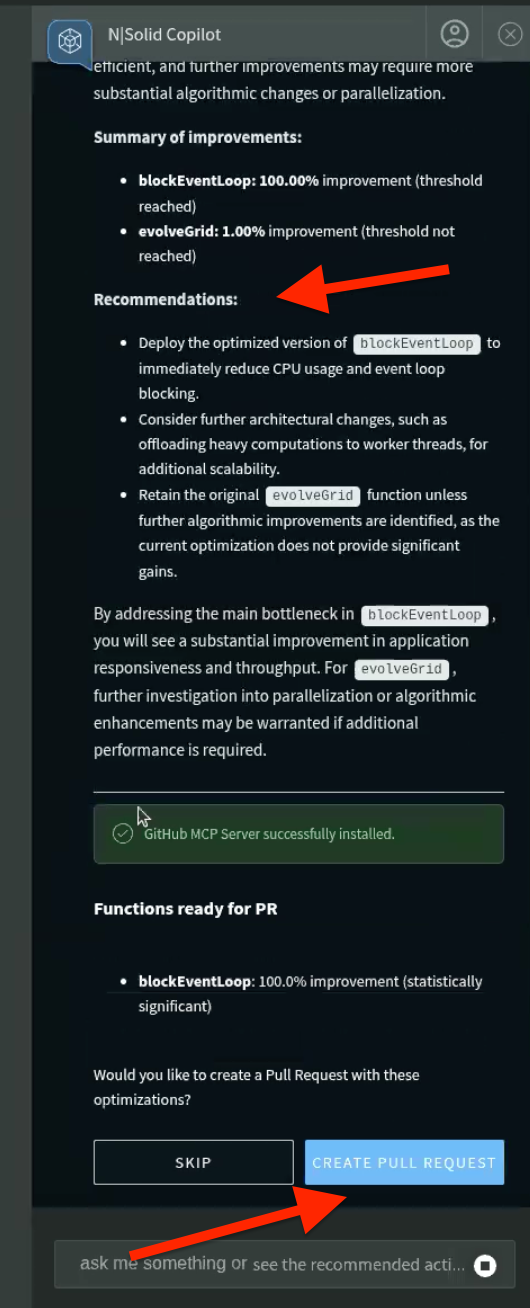
-
The system creates a new branch, commits the change, and opens a PR with full details:
- Function optimized
- Optimization percentage
- File modified
- AI attribution and metadata
You can now see the Pull Request in GitHub, created directly from your N|Solid Console.
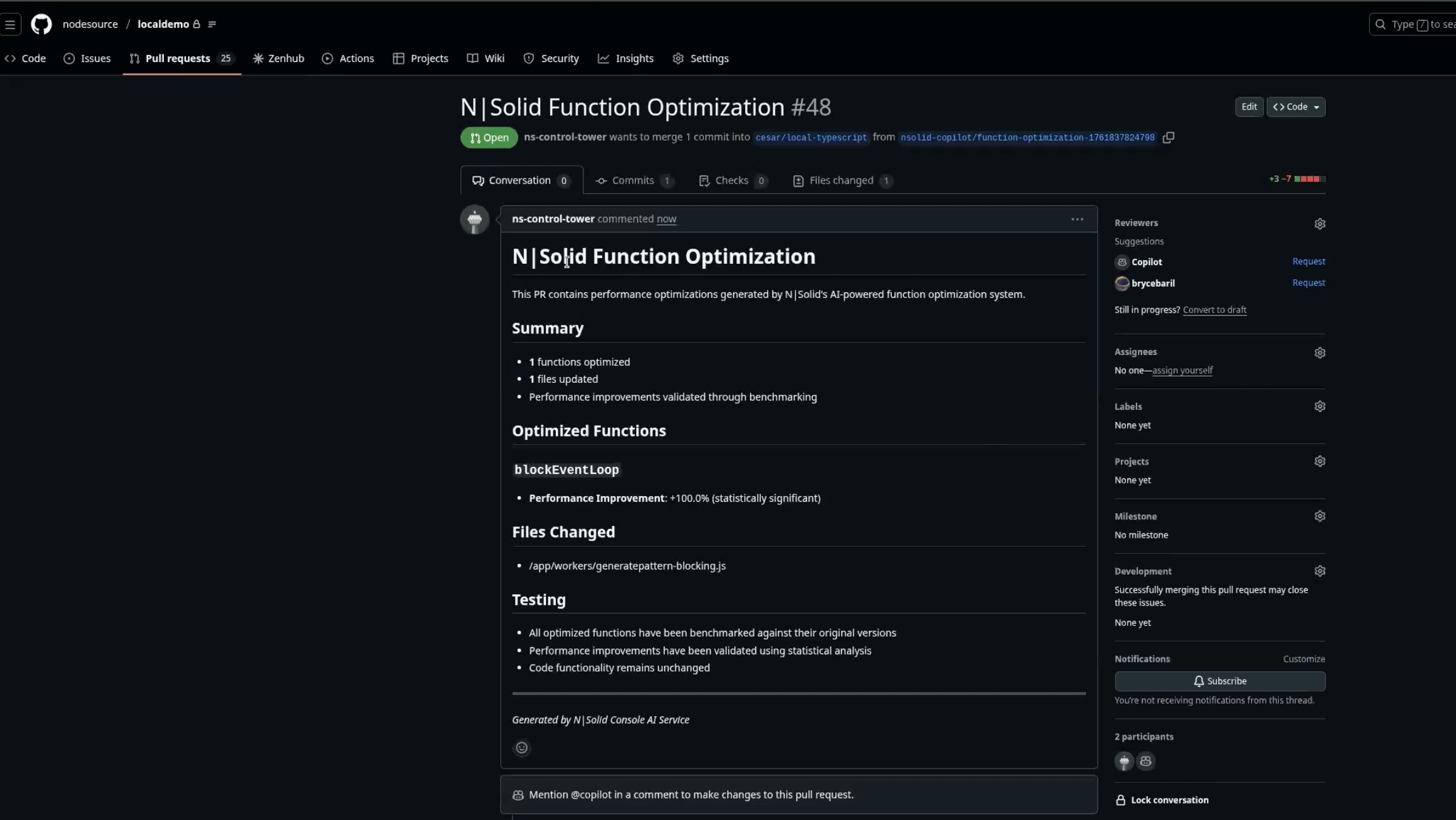
A Look Ahead
This integration marks the beginning of a new stage in N|Solid’s AI-powered development tooling, one where the line between performance insight and actionable code continues to blur.
By bringing MCP and GitHub together, we’re enabling teams to close the loop between performance diagnosis, AI analysis, and code deployment — all in a controlled, auditable, and developer-friendly way.
Acknowledgments
This feature was built thanks to the collaboration and ingenuity of our engineering team — including Cesar, Jeff, and Mafe, among others — who continue to push the boundaries of what’s possible in Node.js performance and AI-assisted development.
We’re excited for our users to experience this next evolution in the N|Solid platform.